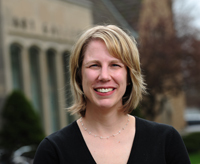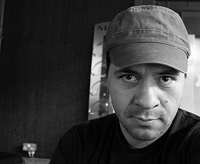
The graduate program in Notre Dame’s Department of Political Science can boast many successful alumni, including high-profile leaders such as former Secretary of State Condoleezza Rice ’75 (M.A.) and former U.S. Ambassador to India Tim Roemer ’85 (Ph.D.).
But as impressive as the achievements of these and other alumni may be, what prospective graduate students seek most is a program that will nurture and develop their own ambitions as scholars. And it’s in this regard, says Christina Wolbrecht, associate professor and director of graduate studies, that the department truly shines.
“In particular, it’s not just that we have a number of outstanding, widely renowned faculty,” she says, “but that many of those same folks are deeply committed to graduate education and are involved and attentive graduate mentors.”
Success in Collaboration
The faculty’s commitment is evident in ways ranging from the pedagogical to the practical. Indeed, Wolbrecht notes that the state of the economy has made an already tight academic job market even tighter, a reality she and her colleagues address in their approach to graduate education.
“It's not enough to simply earn a Ph.D.,” she says, describing the program’s emphasis on professionalization. “You need to show clear evidence of potential for scholarly success—teaching, publishing, grantsmanship, professional activities, and so on.”
Defining and pursuing one’s research agenda is just the first step on the path to gaining these types of experiences; students must then seek out resources to advance their work and appropriate platforms through which to share it.
Wolbrecht says that at Notre Dame, this is a team effort, one that entails collaborations with University and College of Arts and Letters partners like the Institute for Scholarship in the Liberal Arts (ISLA), the Kaneb Center for Teaching and Learning, the Kellogg Institute for International Studies, and the Nanovic Institute for European Studies.
“We require students to submit papers to journals and apply for grants, and—with considerable help from the Graduate School and ISLA—try to provide support and assistance in those efforts,” she says.
“We provide conference funding so students have opportunities to present research, get feedback, and network in their field. A number of institutes and centers on campus provide funds for training and research off campus. And we are working to facilitate research assistantship opportunities so our students can develop research skills and publishing opportunities by working closely with faculty.”
Accolades in the Profession
Place highly talented and driven students in such an environment, and the results will usually speak for themselves.
Recent awards to Notre Dame political science graduate students have included a 2010 Dissertation Completion Fellowship from Mellon/American Council of Learned Societies, a 2010–12 Graduate Research Fellowship from the National Science Foundation (NSF), and two NSF Doctoral Dissertation Research Improvement Grants for 2011–12.
Placements of doctoral program graduates in the last several years have been highlighted by faculty appointments at Baylor University, Villanova University, and Miami University (Ohio) as well as prestigious post-doctoral fellowships at Georgetown University and Emory University. Students have also been hired by outstanding foreign universities, such as Centro de Investigación y Docencia Económicas in Mexico and Universidad Torcuato Di Tella in Argentina.
As for the new graduate cohort that entered the program this fall, Wolbrecht expects she will soon have a similar story to tell about their successes, both in fields where the department has traditionally been strong (e.g., Latin American politics, political theory) and those in which it is an emerging voice.
“We have recruited some very strong students who are interested in religion and American politics because we are now home to two of the leading scholars in that field,” she says, referring to John Cardinal O'Hara, C.S.C., Associate Professor David Campbell and Associate Professor Geoffrey Layman.
“The recently established joint Ph.D. in peace studies and political science has also attracted excellent students,” she continues. “In addition, we have strong incoming students with interests in security studies, an aspect of international relations that has been strengthened in the department in recent years.”
A Winning Combination

Ph.D. candidate Javier Osorio, who received one of the NSF dissertation grants and is researching drug violence in Mexico, was also awarded a Drugs, Security, and Democracy fellowship from the Social Science Research Council and the Open Society Foundation and selected as a Jennings Randolph Peace Scholar by the United States Institute of Peace.
“Academic excellence is achieved not only through sound theoretical foundations and rigorous methodology,” Osorio says, “but also by addressing concerns directly affecting the lives of broad sectors of the population across countries.
“This is the kind of research conducted at Notre Dame’s political science department.”
Learn More >
- Political Science Graduate Program page
- Christina Wolbrecht faculty page
- Institute for Scholarship in the Liberal Arts
- Kaneb Center for Teaching and Learning
- Kellogg Institute for International Studies
- Nanovic Institute for European Studies